外研版(一起)第十一册B11M8U2Habits at school
新标准一起第十一册M8U1讲课

often经常
• sometimes 有时候; • always 总是 • everyday每一天 • never从不
一般现在时,第一人称动词后接原形;单数 第三人称动词要加s或es
A: What does … often … ? B: He/She often … .
• Lingling:What are you doing?
A. Do you • Amy:__B_________
often tidy • your room?•
Lingling:__A_______
Amy:Yes, every day.We can play
B. I’m tidying well in a tidy room. _C___.
Goodbye boys and girls! Thank you !
Lingling:Good idea. You can choose some books.
A: Do you often __t_id_y__ your room?
B: No, I don’t. I don’t often tidy my room .
A: Do you oftenr_e_a_dstories to my little brother? 故事
sitting
stopping
sit
ing swim
Learning tip (知识小贴示):
cu重个tt读 辅in闭 音g音 字节 母结,尾双,写末末尾尾是的一辅个音元字音母s字 ,w母 再im和 加一imnging
cut putting put
tidy
1.I’m tidying my room. 2.Do you often tidy your room? 3.We can play well in a tidy room? 4.Do you often tidy your bookshelf? 5.I will tidy your bookshelf. 6.Now your books are tidy.
外研版七年级下m11基础知识

MODULE 11 Body Language 基础知识1、body language 身体语言2、touch noses 碰鼻子3、nod one’s head 点头4、shake hands 握手shake hands with…和…握手5、That’s because那是因为……We didn’t go for a picnic. That’s because the weather was bad. 我们没有去野餐。
那是因为天气很糟糕。
The weather was bad. That’s why we didn’t go for a picnic. 天气很糟糕。
那就是我们没有去野餐的原因。
6、each other 互相所有格形式:each other’seach+ 名词单数每个……each of 后面接复数名词或代词复数,但做主语的时候,谓语要用单数。
Each of boys has to take one. 每一个男孩必须拿一个7、touch 作动词是,意为:接触、触摸、打动作名词时,意为:接触、联系、关系be/get in touch with 和…取得/保持联系keep in touch with 和…保持联系8、foreign student 外国学生9、stand close to 站得近10、talk to 与……交谈talk with 和……交谈talk about 谈论11、not at all 一点也不, 没关系12、say goodbye 道别say goodbye to 向…道别,向…分手say hello to 和…打招呼say sorry to 向…道歉13. put … together 把……放在一起14. It’s polite to do sth 做某事是礼貌的It’s + adj.+ to do sth 做某事是……此结构的形容词:easy, important, difficult, interesting15、in fact 事实上16. wave to sb 向某人招手wave goodbye/wave to say goodbye 招手道别17、be late for class 上课迟到be late to do sth 做…迟到18、move away 离开,搬走move on 继续移动move about 开来走去19、arm in arm 臂挽臂hand in hand 手拉手face to face 面对面shoulder to shoulder 肩并肩20、be careful 小心be careful with/of 小心对待21、class rule 班规school/family rule 校规/家规22、be rude to sb 对某人粗鲁23、stand in line 站成一排24、enter the lab alone 独自进入实验室25、on time 准时,按时in time 及时26、hold on to 抓紧hold on 等一会儿hold one’s breath 屏住呼吸hold a meeting 开会take/catch hold of 抓住hold hands 手拉手hold back 阻止27、the way to do sth…做某事的方式,方法28. all right 好,形,不错29. remember to do sth 记得要做某事remember doing sth 记得做过某事30. personal space 私人空间31. like doing sth/ like to do sth 喜欢做某事like sb to do sth 喜欢某人做某事32. bring, take与carrybring 表示“拿来,带来”,指从别处把某人或某物带到说话人所在之处,经常和介词to连用take 表示“带走,拿走”,指从说话人所在地把某人或某物带走或拿走,经常和介词with 连用carry仅表示“携带,带着”,不含方向性。
《英语》(新标准)(一起)第十一册M8
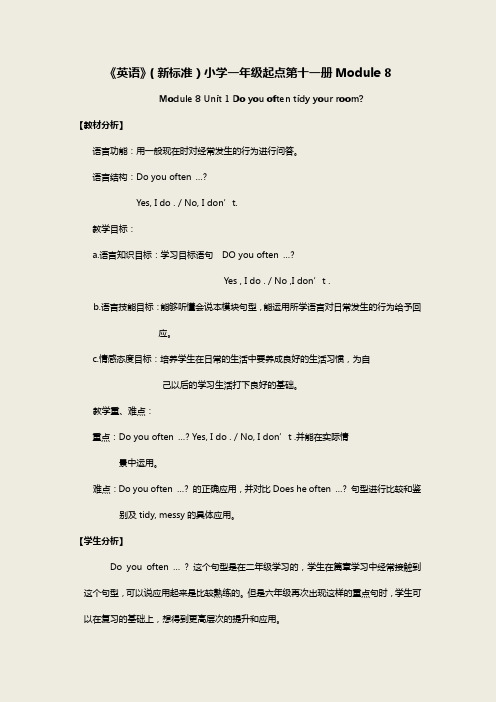
《英语》(新标准)小学一年级起点第十一册Module 8Module 8 Unit 1 Do you often tidy your room?【教材分析】语言功能:用一般现在时对经常发生的行为进行问答。
语言结构:Do you often …?Yes, I do . / No, I don’t.教学目标:a.语言知识目标:学习目标语句DO you often …?Yes , I do . / No ,I don’t .b.语言技能目标:能够听懂会说本模块句型,能运用所学语言对日常发生的行为给予回应。
c.情感态度目标:培养学生在日常的生活中要养成良好的生活习惯,为自己以后的学习生活打下良好的基础。
教学重、难点:重点:Do you often …? Yes, I do . / No, I don’t .并能在实际情景中运用。
难点:Do you often …? 的正确应用,并对比Does he often …? 句型进行比较和鉴别及tidy, messy的具体应用。
【学生分析】Do you often …? 这个句型是在二年级学习的,学生在篇章学习中经常接触到这个句型,可以说应用起来是比较熟练的。
但是六年级再次出现这样的重点句时,学生可以在复习的基础上,想得到更高层次的提升和应用。
【设计理念】教师采用了“任务型”的教学方式进行设计。
首先在操练环节,应该在一种师生,生生的任务型互动中让学生感受到学习任务的真实性,从而让他们愿意参与到活动来,运用中来。
在运用环节中,通过巩固题目的设计,让学生从课文走向语用的天地,通过让学生大胆的输出,真正提高学生在运用时的准确性。
[教学准备]挂图、卡片、图片、CD-ROM、录音机、调查表【教学过程】Ⅰ. Warm-up(热身活动)a.教师让学生自由畅谈,引导的问题是:What do you often do ?b.出示一些短语,(tidy your room , suck your thumb, read books,go to the library.学生用书31页的短语)教师通过Do you often…? 进行替换练习,并试着让学生做Yes , No 的回答。
外研版一起小学英语五上《Module 8Unit 1 Children often sit around tables.》word教案 (1)
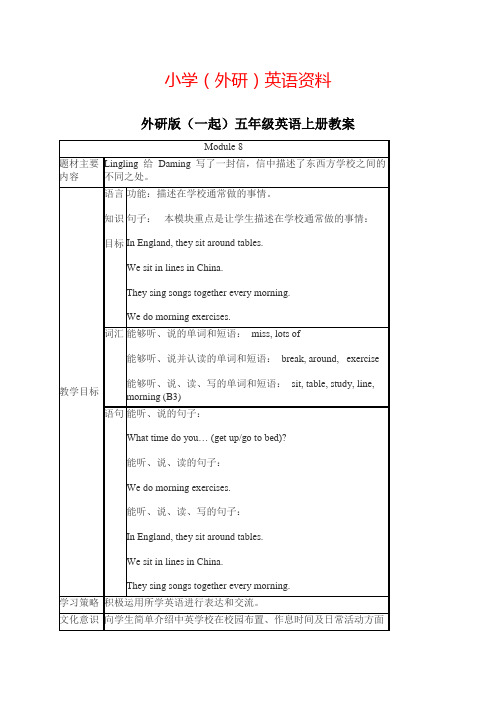
小学(外研)英语资料外研版(一起)五年级英语上册教案Module 8 unit l They sit around tables.一、教学目标与要求1.知识与能力目标掌握听说词汇:miss掌握听说读词汇:aroud, exercise掌握听说读写词汇:sit, table. line morning掌握句型:In England, they sit around tables. We sit in lines in China. They sing songs together every morning. We do morning exercises.2. 情感态度目标:了解中西方学校在各方面的差异,热爱自己的学校。
二、教学重点及难点:掌握中西方学校的几个差异及动词词组的发音、使用.三、课前准备:单词卡、CAI四、教学过程Step1 Warm upFree talkLook, this is our school. Do you like our school?What is our school like?( 出示我们学校的图片,引导学生描述学校)T :Our school is very beautiful.Step2 Presentation and practice1. 学习词汇table.We’re in a classroom. There are some tables. (table-----tables)注意强调双元音/ ei / 的发音2. 学习词汇line sit We sit in lines. They sit around tables.教师辅以肢体动作并举例。
引导学生理解sit 、line around 的含义。
Sa Sb Sc and Sd sit in line.Se Sf Sg sit in line.We sit in lines in China.操练sit in lines教师请几名学生到教室前已摆好的桌子前面对面坐好T :They sit around tables.小Chant :sit sit, sit in lines, sit sit, sit around tables.3. 学习课文This is a Chinese school . Do you know about the schools in England? Let’s watch TV and find the answers.( 播放前两段录音)What did Lingling do yesterday?What do they do every morning?What do we do every morning?(Practice in pairs.)She took photos.They sing songs together every morning.We do morning exercises.就学生的回答学习took photos. sing songs. do morning exercises.练习词组并加以肢体动作。
外研版高中英语必修2-Module one Our Body and Healthy Habits
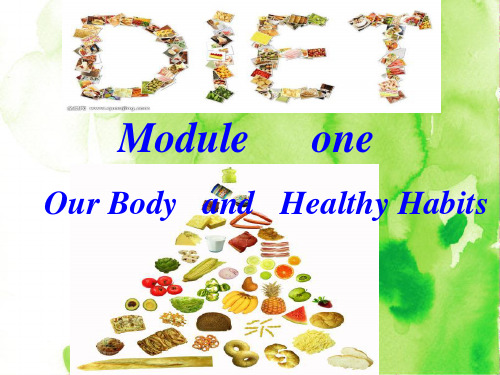
potato
cake fried chicken tomato leg
banana grape hamburger onion
apple barbecue cucumber carrot
Proper nutrition is important for good health. Don’t eat too much food with lots of fat and sugar. Eat plenty of food high in protein like meat, fish, eggs and nuts. Vegetables and fruits are very important because they provide necessary vitamins and minerals. However, don’t overeat.
(2) eating _fi_s_h_4__ti_m__es__a_w__e_ek_ (3) avoid eating _f_a_t_o_r_s_u_g_a_r__
情景再现(work in pairs) Zhou Kai (1)
Work with your partner to make up a dialogue according to Zhouikai 1.
Getting the proper amount of sleep is also important. If you don’t get enough sleep, you will feel tired.
Fast reading
Module 1 Our Body and Healthy Habits外研版必修二Module1 Our body and Healthy habits全单元课件 (1)

由于老人带路,我们没有困难就找到了那栋
旧房子。 We had no difficulty in finding that old house with the old man leading the way . 因为这个问题解决了,我们感到很高兴. With the problem solved, we all felt very happy.
without 的复合结构
with / without +宾语+宾补 with/ without + n. + 介词短语 表示伴随或原因
adj / adv
doing (主动或动作正在进
行)
done (被动或动作已经完成
to do (表动作还未发生)
老师手里拿着一本书进来了.
The teacher came in with a book in his hand.
8. pain n 疼痛
精神上的痛苦---不可数名词
肉体上的疼痛使----可数/不可数
我感觉胸疼。 Eg : I feel a pain in my chest . be in pain 处于痛苦之中 a sharp pain 剧痛
pains n 努力,辛苦 take pains to do
take pains with sth
spare no pains to do 他不辞辛劳的工作
不辞劳苦地做 某事
Eg : He takes pains to work .
No pains , no gains . 不劳无获。 painful adj 疼痛的,使人感觉疼痛的 他的肩膀依然很疼。 Eg : His shoulder is still painful . 手术很疼。 The operation was very painful .
外研版新标准英语一起点十一册备课m9u1What do you like doing?

welcome to use these powerpoint templates, New Content design, 10 years experience
Diagram
welcome to use these powerpoint templates, New Content design, 10 years experience welcome to use these powerpoint templates welcome to use these powerpoint templates, New Content design, 10 years experience
Pei Wenjing
Let's chant
Parrot,parrot,what do you like doing?
Singing, singing, I like singing.
Monkey, monkey, what do you like doing?
Playing , playing, I like playing.
trees.And it is very clever. it is white and black.It likes eating bamboo. It is lovely. It walks slowly.
it has a big bag in his body. (手势表示)It likes juse these powerpoint templates, New Content design, 10 years experience
welcome to use these powerpoint templates, New Content design, 10 years experience
小学英语外研版一起一年级下册一下M10u11

小学英语外研版一起一年级下册电子备课教案模板期末测试题班级_____________ 姓名_____________听力部分一、听音,给每组单词排序。
1. like kite let2. mouth mother monster( ) ( ) ( ) ( ) ( ) ( )3. tiger tired chair4. lion long little( ) ( ) ( ) ( ) ( ) ( )5. there these them6. shirt shorts shoe( ) ( ) ( ) ( ) ( ) ( )二、听音,判断下列图片是否与你听到的内容相符,相符的划√,不符的划×。
1. 2. 3. 4.( )( ) ( ) ( )5. 6.7.8.( ) ( ) ( ) ( )三、听音,选择正确答案。
( ) 1.There is____under the tree. A. a dog B. a cat( ) 2.There are two____ in the tree. A. animals B.elephants ( ) 3. There is a pair of shorts under that_____. A .duck B .chicken( ) 4.There is a pair of _____ over there. A .shoes B.socks ( ) 5.There is _____ socks on the floor. A. a pair B.a pair of( ) 6.There is a ____under the table. A. shorts B.shirt ( ) 7.There is a _____ on the head. A. hat B. cat( ) 8.There are three ____ over there. A. tigers B. snakes ( ) 9.Let’s _______our clothes. A. put in B.put on四、听音,根据对话中的上一句选择相应的答语。
外研版必修第一册Unit2重点句型归纳整理
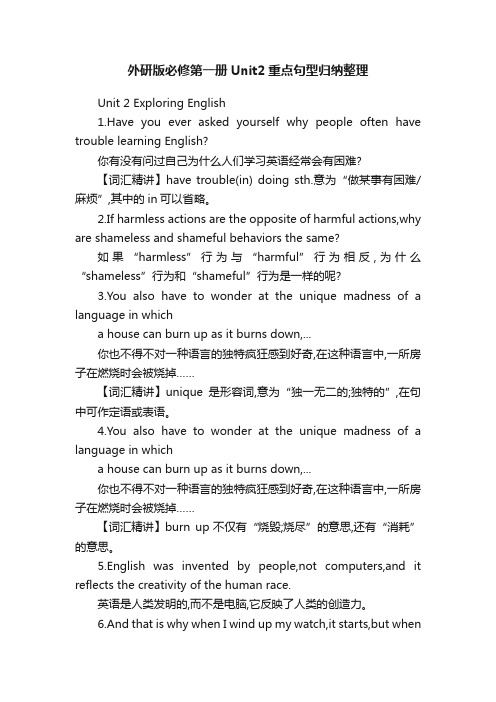
外研版必修第一册Unit2重点句型归纳整理Unit 2 Exploring English1.Have you ever asked yourself why people often have trouble learning English?你有没有问过自己为什么人们学习英语经常会有困难?【词汇精讲】have trouble(in) doing sth.意为“做某事有困难/麻烦”,其中的in可以省略。
2.If harmless actions are the opposite of harmful actions,why are shameless and shameful behaviors the same?如果“harmless”行为与“harmful”行为相反,为什么“shameless”行为和“shameful”行为是一样的呢?3.You also have to wonder at the unique madness of a language in whicha house can burn up as it burns down,...你也不得不对一种语言的独特疯狂感到好奇,在这种语言中,一所房子在燃烧时会被烧掉……【词汇精讲】unique是形容词,意为“独一无二的;独特的”,在句中可作定语或表语。
4.You also have to wonder at the unique madness of a language in whicha house can burn up as it burns down,...你也不得不对一种语言的独特疯狂感到好奇,在这种语言中,一所房子在燃烧时会被烧掉……【词汇精讲】burn up不仅有“烧毁;烧尽”的意思,还有“消耗”的意思。
5.English was invented by people,not computers,and it reflects the creativity of the human race.英语是人类发明的,而不是电脑,它反映了人类的创造力。
外研版一起点六年级上册英语 Module 8 Unit 2课件
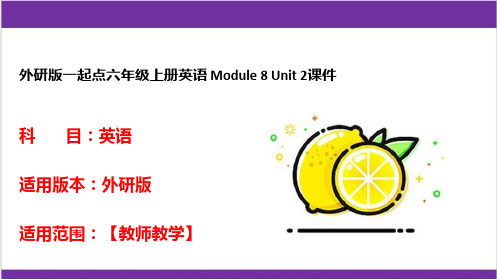
eat bananas go swimming
cook dinner
clean the classroom
send emails
drink tea play basketball collect stamps
第二十一页,共二十三页。
5 Ask and answer.
never
sometimes
often always
“That is what you do. And then clean my shoes,” said the lady.
“Clean my shoes.”
第十八页,共二十三页。
4 Listen and say. Then chant.
“Hurry up! Hurry up! And clean my house,”said the lady. “Clean
外研版一起点六年级上册英语 Module 8 Unit 2课件
科 目:英语 适用版本:外研版 适用范围:【教师教学】
Unit 2 I often read English books.
Module 8
…………………………………
第一页,共二十三页。
单元新知
第二页,共二十三页。
单元新词
never
从不
often
sometimes
never
I always play football.
第十三页,共二十三页。
3 Look and write.
Write about yourself.
always
often
sometimes
never
I sometimes clean my room.
六上M2U1 i went to Vhinatown in NewYork yesterday
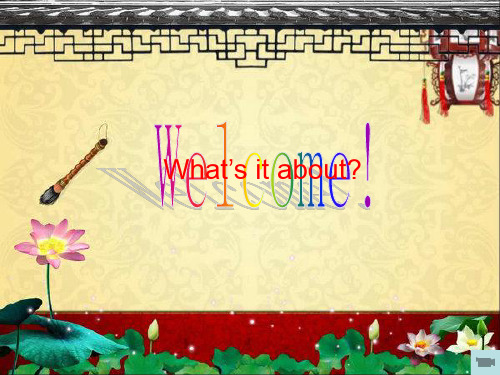
外研社新课标一起第十一册
Module2 Unit1
I went to Chinatown in New York yesterday.
Learning Aims
1. 能掌握“There be….”及“I did…” 的句型结构 并进行替换。 2. 能运用一般过去式对以前做过的事情进行描述。 3. 通过对唐人街的了解增强民族自豪感, 理解民族间的文化融合。
1.I went to Beijing.
2.There were many beautiful places. 3.I ate fried tofu. 4.I saw the Tian’an men Square .
5.I played on the beach.
6.I climbed the Great Wall.
Chinese They ate in a ________________ restaurant.
lion dance in the street. They saw a ________ ________
went
had
were
spoke
ate
saw
Daming is going to write an email to his mum, let’s help him.
4. 提高运用英语进行日常交流、 表述的能力。
Review
surprise subject
everywhere
Chinatown
speak spoke
lion dance
多伦多
日本
纽约
华盛顿
纽约 Chinatown Daming and Simon went to ___________ New York in ___________yesterday.
小学英语新外研版(一起)六年级上册新标准Module 8 Unit2.习题第一课时

小学英语新外研版(一起)六年级上册
Unit 2 《I often read English books.》习题
第一课时
一、基础题
将短语的意思填入与其相对应的括号内.
1. always ( )
2. never ( )
3. sometimes ( )
A.从不
B. 有时
C. 一直
二、综合题
将下面单词的字母序号填在与其相对应的横线上。
(使用‘学乐师生’App.录音,录下下面的重点句型,并把它们背诵下来!记得在日常生活中经常使用哦!记得和全班同学一起分享!)
1. I _____(从不)play football.
2. Do you ____ read books?.(常常).
3.I’m ____(一直) here.
A. always
B. never
C. often
三、提高题
单项选择。
()1. I always ___ my bike to school.
A.ride
B. rides
C. to ride
()2.I___ always here.
A.am
B. are
C. is
()3.You ___ sometimes here.
A.am
B. are
C. is
参考答案
一、基础题
1. C
2. A
3. B
二、综合题
1. B
2. C
3. A
三、提高题
1. A
2. A
3. B。
外研版一起点六年级下册英语 Module 10 Unit 2课件
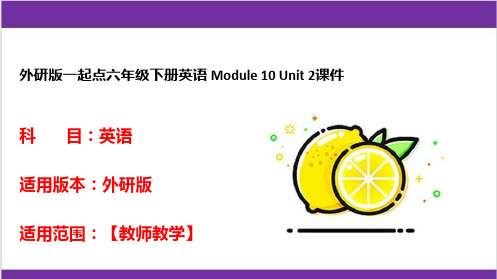
History, Science, Geography and French. ●What is Lingling going to study?
Physics, Chemistry ,Chinese, History and Geography. ●Which middle school do you like? Why?
第八页,共十五页。
4 Listen and say. Then chant.
School is nearly finished. It's time to start anew.
Now I can speak English.
I can speak to you.
It's time to say goodbye now.School is going to end.
Chemistry and Chinese. I'm also going to study History and Geography. But I'm not going to study French.
第六页,共十五页。
3 Now read and answer the questions.
第十四页,共十五页。
课时小结
词汇 : geography same
句子 : What about you? I’m going to study History,Science and English.
But we can write in English
and we will always be friends.
第九页,共十五页。
5 Follow and say.
外研版英语八年级上册Module 11单元知识点归纳总结(详细版)-word

Module11 Way of lifeUnit1 In China, we open a gift later.1.It’s cool to wear a cap back-to-front.把鸭舌帽前后反过来戴很酷。
2.If she is interested in playing chess, it’s a good idea t o choose a chess set as a present.3. We Chinese usually have meals with chopsticks/ while Westerners(西方人) use knives and forks for meals. This pair of chopsticks is pretty nice. (谓语是由 pair 决定的)A knife and fork ___ on the table now. (is)a knife and fork 一副刀叉表示一个整体,用单数。
4.A bar of chocolate is a perfect choice for those who prefer(更喜欢) sweet food.5.Students need to look up new words in dictionar ies to improve their study.6. Little babies would like to play with toy s.7. Video games are not popular with teenagers any longer now. 现在电子游戏不再受青少年欢迎了。
8.Here’s your gift.Here’s the change( 找头,零钱)/money.Here are some flowers for you.9. What a big surprise! n.1)in surprise“惊奇地”常位于动词之后作状语,表示方式。
外研社一起英语第11册教学计划
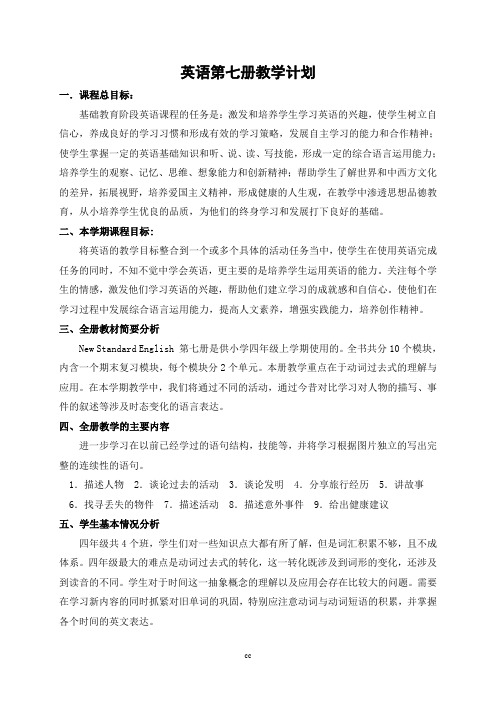
英语第七册教学计划一.课程总目标:基础教育阶段英语课程的任务是:激发和培养学生学习英语的兴趣,使学生树立自信心,养成良好的学习习惯和形成有效的学习策略,发展自主学习的能力和合作精神;使学生掌握一定的英语基础知识和听、说、读、写技能,形成一定的综合语言运用能力;培养学生的观察、记忆、思维、想象能力和创新精神;帮助学生了解世界和中西方文化的差异,拓展视野,培养爱国主义精神,形成健康的人生观,在教学中渗透思想品德教育,从小培养学生优良的品质,为他们的终身学习和发展打下良好的基础。
二、本学期课程目标:将英语的教学目标整合到一个或多个具体的活动任务当中,使学生在使用英语完成任务的同时,不知不觉中学会英语,更主要的是培养学生运用英语的能力。
关注每个学生的情感,激发他们学习英语的兴趣,帮助他们建立学习的成就感和自信心。
使他们在学习过程中发展综合语言运用能力,提高人文素养,增强实践能力,培养创作精神。
三、全册教材简要分析New Standard English 第七册是供小学四年级上学期使用的。
全书共分10个模块,内含一个期末复习模块,每个模块分2个单元。
本册教学重点在于动词过去式的理解与应用。
在本学期教学中,我们将通过不同的活动,通过今昔对比学习对人物的描写、事件的叙述等涉及时态变化的语言表达。
四、全册教学的主要内容进一步学习在以前已经学过的语句结构,技能等,并将学习根据图片独立的写出完整的连续性的语句。
1.描述人物 2.谈论过去的活动 3.谈论发明 4.分享旅行经历 5.讲故事6.找寻丢失的物件 7.描述活动 8.描述意外事件 9.给出健康建议五、学生基本情况分析四年级共4个班,学生们对一些知识点大都有所了解,但是词汇积累不够,且不成体系。
四年级最大的难点是动词过去式的转化,这一转化既涉及到词形的变化,还涉及到读音的不同。
学生对于时间这一抽象概念的理解以及应用会存在比较大的问题。
需要在学习新内容的同时抓紧对旧单词的巩固,特别应注意动词与动词短语的积累,并掌握各个时间的英文表达。
(外研版)小学英语1~8册_知识点复习_词汇_词组_句型

外研版第1册主要内容词汇:boy girl door window blackboard bird desk chair red blue yellow green black dog cat cap panda one two three four five six seven eight nine ten eleven twelve school teacher bag pencil pen book cake kite mother father grandpa grandma sister brother doctor driver policeman nurse farmer head arm leg foot nose eye mouth ear句子:----Good morning! ----Good morning! ----Good afternoon! ----Good afternoon!----How are you?----I’m fine, thank you ----What’s your name?----I’m ….----Point to the door/window/blackboard….. ----Stand up/ Sit down, please.----What colour?----It’s red/blue…. ----How many? ----One/Two/Three….----What’s this/that? ----It’s a chair/desk…----Happy birthday! ----Thank you.---- Here’s your present/cake. ----Thank you. ----How old are you? ----I’m nine.----Is it a cat? ----Yes, it is./ No, it isn’t. ----Where’s the cat? ---I don’t know./ It’s in the green bag.---- This is my father. ----He/She’s a doctor/nurse…. \---- This is his/ her arm/head….外研版第2册主要内容词汇:song toy car ship doll animal monkey tiger lion elephant big small fat thin tall short sport football basketball table tennis riding bikes swimming skipping meat rice noodles fish milk banana pear orange apple Chinese Maths Science Music Art PE play sleep sing give eat Christmas spring summer autumn winter hot warm cool cold sunny windy dress coat sweater T-shirt bike bus walk in on under park词组:get up go to school have lunch go home watch TV go to bed have breakfast have dinner Spring Festival New Year fly kites go to work by bus by bike go fishing句子:My favourite toy is a car/ doll…----What’s this/that? ----It’s a tiger.----What are they? ------ They’re lions. I like/ don’t like football/ basketball….I like/ don’t like swimming/skipping…. ----Do you like meat? ----Yes, I do./ No, I don/t.----Does Daming/he/ she like bananas? -----Yes, he does./ No, she doesn’t.I get up at seven o’clock. ----What’s the time, please? ---- It’s half past seven.----What do you do at the weekend? ----- I play football.----What does he/she do at the weekend? ---- He/ She watches TV.Happy New Year. It’s spring/ summer/ autumn/ winter.It’s warm/hot/cool/cold in spring/summer/ autumn/ winter. I’ve got a new book.----Have you got a new book?--- Yes, I have. / No, I haven’t.----Has Tom/he/she got a new book? ----Yes, he/she has. / No, he/she hasn’t.Amy/ He/ She goes to school by bike/ by bus/by car. I t’s in/ on/ under the desk….外研版第3-4册主要内容一、情境问答:第三册1. Have you got_______? Yes, I have. No, I haven’t.2. Excuse me. Where’s the________, please Go straight on. Turn right. Turn left.3. What are you doing? I’m _______ What is he/she doing? He’s/She’s ___________ What are they doing? They’re __________4. Do you want some _______? Yes, please. No, thank you.5. Can you _____ ? Yes, I can. No, I can’t.6. What are you going to do? I’m/We’re going to _______7. Can I have some ______ ? Yes, you can. Sorry, you can’t.8. How many ____ are there in ____? There is/are______第四册9. Is it _____? Yes, it is. No, it isn’t.10. Will you _____ ? Yes, I will. No, I won’t.11. Was he/she/it _____? Yes, he/she/it was. No, he/she/it isn’t.Were you ______? Yes, I was. No, I wasn’t.12. Did you/he/she/they____? Yes, I/he/she/they did. No, I/he/she/they didn’t.二、词组短语第三册take pictures watch TV read a book write a letter listen to music talk to my friend play with in the park look at row a boat under the tree play chess play football play basketball play table tennis make a cake do the high jump do the long jump第四册have a picnic go swimming go to the park do homework speak English 情景运用:第三册1. 问路、指路Excuse me. Where’s the _______, please? Go straight on. / Turn left. / Turn right.2.询问对方正在做什么What are you doing? I’m _______ What is he/she doing? He’s/She’s ___________ What are they doing? They’re __________3. 询问对方是否要吃某种食物Do you want some _______? Yes, please. No, thank you.4. 询问对方的能力Can you _____? Yes, I can. No, I can’t.5. 谈论将要做的事情What are you going to do? I’m/We’re going to _________6. 向别人要东西吃Can I have some ______ ? Yes, you can. Sorry, you can’t.第四册7. 介绍某人This is_______8. 谈论周一至周日将要做的事What will you do on Monday? I’ll_______ on MondayWill you ______ on Monday? Yes, I will. No, I won’t.9. 做天气预报It will be hot/cold/sunny/windy.It will snow/rain.10. 做比较如: Sam is older than Daming.外研版第5-6册主要内容e backst Sunday/night/year3.go home4.go to school5.go to the park6.hurry up7.in a hurry8.wait for9.make a list 10.shopping list 11.half a kilo 12.how many13.how much 14.at the weekend 15.in the morning 16.in the afternoon 17.take a photo 8.take photos 19.the British Museum 20.Big Ben 21.the Great Wall 22.the London Eye 23.give out 24.be careful25.too many 26.run fast 27.play football 28.half past seven29.get up 30.sit down 31.stand up 32.do morning exercises33.play chess 34.on the farm 35.all day 36.of course37.go out 38.say hello to 39.play basketball 40.play table tennis41.many years ago 42.ten years ago 43.three days ago 44. live in45.a lot of=lots of 46.watch TV 47.how about=what about 48.talk about 49.foreign language 50.study/work hard 51.an English teacher 52.a Chinese teacher 53.by bus/plane/car/train/ship/bike 54.English/ Chinese food55.at school3.at home 56.at the library 57. library car 58.find out 59.be good at 60.look at 61.have /has got 62.in the east of China 63. in the west of China 64. in the south of China 65. in the north of China 66.every year/day 67.send an email 68.a good idea 69.listen to 70.be read for1.Did your grandma learn English? Yes,she did. /No, she didn’t.2.What did she have for breakfast? She had eggs and sausages.3.Where are the books about…? They are on Shelf C.4.When did you go to…? I went there in July.5.What about chopsticks? It’s a good idea.6.Why don’t you give him a kite ? Because……7.Did you…? Yes, I did. /No, I didn’t.8.When did you come back ? We came back last Sunday.9.How many bananas do you want? Six,please.10.How much chess do you want? Half a kilo.11.Do you like…? Yes,I do. /No,I don’t.12.Where did you go ? We went to the British Museum.13.What did you do at the weekend? We visited lots of places.14.What’s the matter?15.Whose bag is this ? It’s Lingling’s.16.Is this your cap? Yes, it’s mine.17.There be+ 某物+某地18.Can you…? Yes, I can. /No, I can’t. 19.What time do you get up? I get up at half past six.外研版第7-8册主要内容第七册1.These postcards are great! It’s a picture of the Great Wall. Tell me more about the Great Wall. Howlong is it?2.There’s a Chinatown in New York! There are lots of Chinese shops and restaurants there.3.I’ve got lots of stamps. These are some stamps from Canada. This stamp is from China.4.Thanksgiving is my favourite festival. We always have a special meal.5.Can you speak English? Can I write to your friend?6.Daming has got a Chinese kite and we fly it in the park. I’ve got some chopsticks, but they aredifficult.7.Pandas eat for twelve hours a day.8.Do you often play with dolls? Do you often clean your room?9.Do you want to visit the UN building in New York?10.Don’t talk in the library. Please stand in line.第八册1.What do you want to eat? I want a hot dog, please. How much is it? It’s thirteen dollars andtwenty-five cents.2.When are we going to eat? We’re going to eat at half past twelve. It’s going to snow in Harbin.3.The sun is shining. The birds are singing in the trees. The ducks are eating our picnic.4.Who can help me? Sorry, I can’t. I’m making Daming’s birthday card. I can help you.5.Daming is having a birthday party. Daming is playing the trumpet, but the phone is ringing.6.I brought you this book. Who gave it to you? Simon’s family gave it to me.7.Shenzhou V flew into space with Yang Liwei. He spent about twenty-one hours in space. He made avideo and now he is very famous.8.Helen Keller became blind and deaf. She couldn’t see and she couldn’t hear. Later she could read andwrite. She wrote a book about herself.9.what’s the matter? Why are you laughing? Why are you wearing a raincoat? Because it’s going to rain.10.Are you going to go to middle school this September? Yes. I’m really excited. What are you going tostudy?答题技巧:1.以Is\Are\Was\Were\Can\Should\Could\Do\Did\Does\Have\Has。
外研版高中英语必修2 Module 1 Our Body and Healthy Habits reading 教学课件
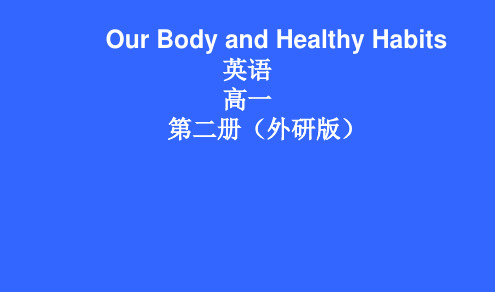
have to diet
Language points 1. Zhoukai’s mother has made sure they eat healthily. make sure of/about/that从句 • Translate 请确定好飞机起飞的时间 Please make sure of /about the time when the plane takes off _________________________________________
Read Paragraph 1 and find out Dos’
What are Zhoukai’s healthy eating habits
பைடு நூலகம்
Don’ts
eat much fat or sugar __________________________
have a sweet tooth
__________________________________
What are Zhoukai’s healthy eating habits
Don’ts
eat much fat or sugar __________________________
have a sweet tooth
__________________________________
eat fresh fruit and vegetables ________________________________
eat fresh fruit and vegetables ________________________________
- 1、下载文档前请自行甄别文档内容的完整性,平台不提供额外的编辑、内容补充、找答案等附加服务。
- 2、"仅部分预览"的文档,不可在线预览部分如存在完整性等问题,可反馈申请退款(可完整预览的文档不适用该条件!)。
- 3、如文档侵犯您的权益,请联系客服反馈,我们会尽快为您处理(人工客服工作时间:9:00-18:30)。
These are our habits at school. What about yours?
Try to write
Try to write the words.
试着O把ur这H些ab单its词a写t S出ch来o吧ol
Role play
Standards for evaluation
(评分标准)
Read and Act
能表演。
Read dramatically
能有感情朗读。
Read
能朗读故事。
poster
Retell My friends’ habits at school
Maomao never plays football. She doesn’t like it.
Lili sometimnesecvleearns the bslackboard for the teachers.
Gery loves English. He often reads English books.
Simonsoamlwaeytsimrideess bike tosschool. He never goes by bus.
Habits at school
Free talk
draw pictures
tidy the bed
What home habits did you hear?
wash clothes
read books
cook dinner
Revision
often… tidies the bed
Habits at home
s
books
often reads English
always rides bike
never es
Discuss and say
poster
Discuss in groups.
小组讨论,想想丢失的单词是什么?
Listen and check
Our Habits at School
Our school life is very colorful.
never sometimes
often always
×× ×× × × × × ×___ clean the blackboard for my teachers.
Duty Roster of a month(每月值日表)
sometimes
never often sometimes always
We have different classes everyday, such as
Maths, Eng1lish, PE and Computer class. And we
alw2 ays do morning exercise on the playground.
We like playing, so we oft3en play games at the
The teacher writes words on the blackboard.
She teaches us to read.
After class,Lili somretaidmes cleans the
blackboard for her.
clean
/i: /
I love English. I ______ read English books.
never…
tidy the desk
tidies the bed
We should develop good habits at home.
What are their habits at school?
Watch and match
Watch and match
1. I sometimes clean the blackboard for my teacher.
never often sometimes always
Listen and imitate
Pronuciation(语音) Intonation (语调)
Feeling(感情)
Role play
Yes/ No.
Do you never/often/
I never play football. I don't like it.
break time. After lunch, we sometimes read
books and som4etimes we draw pictures. But we
nclea5vsesrroroumn
or shout in the is very quiet.
classroom.
So
our
Reading books is a good habit. Often read English books, you
can learn English better.
never often sometimes always
I _______ ride my bike to school.
I ______ go by bus.
play with your partner. (选择自己喜欢的人物,
和同伴进行角色扮演)
3. Show time
Yes/ No. I love English. So I often
read English books.
Yes/ No. I always ride my bike to school. I never go by bus.
soamlweT1at.yiimOps.s.ne.:?se/minutes to read the
by yourself. (一分钟自由朗读)
YIdesioas/mloNegtoui.mees clean the
blackboard for my
2. Choose your favorite charactetrea, crhoelers.
2. I never play football.
3. I always ride my bike to school.
4. I often read English books.
Think, listen and choose
I _______ play football.
I don't like it.
